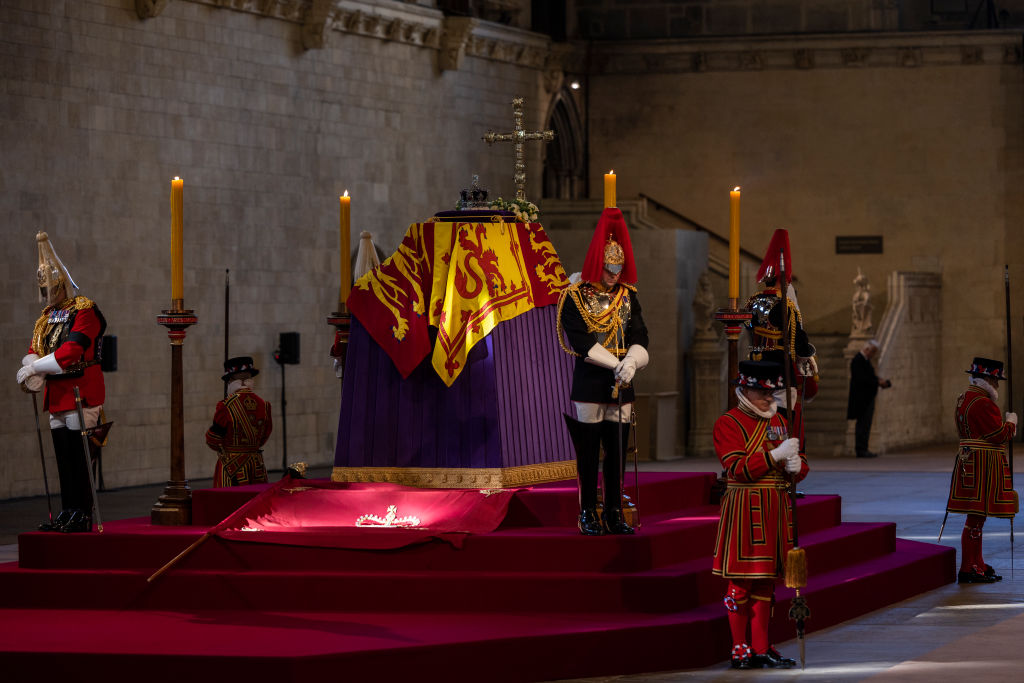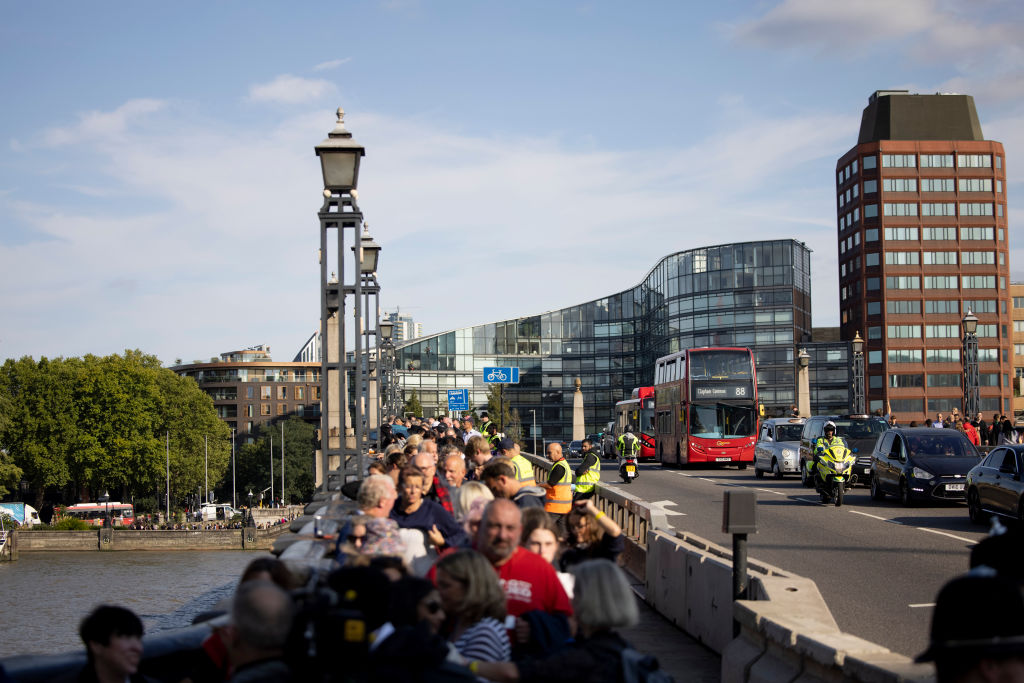If there is one thing British people excel at, it’s standing in a line. And thousands of them did on Wednesday afternoon in the hopes of getting the chance to pay their final respects to Queen Elizabeth II, whose coffin will lie in state at the Palace of Westminster in central London until the morning of her funeral on Monday, Sept. 19.
Many of the people who spoke to TIME along the River Thames, just a 20-minute walk away from the parliament building under normal circumstances, had been waiting upwards of five hours along a path spanning several miles. For some, it was a chance to pay their respects to the only monarch they have ever known. For others, it was an opportunity to experience British history firsthand.
The last time someone in Britain lay in state, a ceremonial tradition in which a closed coffin is placed in public view for mourners to pay their respects, was for Queen Elizabeth II’s mother, the Queen Mother, in 2002. The last time Britain mourned a sovereign was in 1952 after the death of Queen Elizabeth II’s father, King George VI.

“It’s a moment in history,” says Jane, 65, who had been waiting in line since 11 a.m., six hours before the public viewing of the Queen’s coffin began. “I wouldn’t miss it for the world. So we keep queueing.”
Unlike many of the somber ceremonies that have taken place in the aftermath of the Queen’s death, the atmosphere among those waiting in line was, in some ways, a more festive affair. Many made “queue friends” with those standing beside them, while others broke out board games and snacks to help pass the time. “People are just happy to be here and happy to share this moment in history,” says Sadie Hamilton, a 21-year-old history student who joined the line at 11 a.m. with a bouquet of flowers in hand. After several days of mourning Queen Elizabeth II’s death, this felt “more so [like] a celebration of her life.”
Read more: What To Know About Queen Elizabeth II’s Lying in State
“This is so British it’s unbelievable,” Nigel Farage, the right-wing British politician and arch-Brexiteer, marveled between TV appearances.
Still, there are many for whom the last several days have been difficult—not just on an emotional level, but one a spiritual one, too. In addition to being the country’s head of state, Queen Elizabeth II was also the spiritual head of the Anglican Church, a role that now falls to her son, King Charles III. Among the volunteers scattered across the queueing route was a group sporting reflective vests with the words “faith team” printed across their backs. Harrie Cedar, a Jewish chaplain at Guy’s and St Thomas Hospital in London, tells TIME that she and her fellow faith advisers were there to help those for whom this event was a more difficult and lonely affair. “Most of the people seem to be in a very good mood,” says Cedar. “But we’ve had a few that haven’t been. And some people don’t realize they’re about to walk into a place where a coffin is.”

British authorities are bracing for as many as 1 million people to visit Queen Elizabeth II’s coffin over the next four days—the majority of whom, it’s safely assumed, are fans of Britain’s constitutional monarchy. But not everyone who chose to stand in line necessarily identified themselves as avowed monarchists. Many simply respected Elizabeth II’s long reign. “I was a big fan of the Queen—not necessarily as a monarch, but as a person,” says Patrick Whelan, a 20-year-old from Hampshire, in Southwest England. As he and his brother saw it, she gave 70 years of her life to the country’s service. “I think we can find some hours in our own day to come and pay our respects in return,” says Connor Whelen, 23.
But for Elizabeth Munsah, 50, who emigrated to Britain from Ghana more than 20 years ago, waiting to view the Queen’s coffin was about paying tribute to what she represented. “She is a special lady, uncontroversial—I can say nothing wrong about her,” says Mensah, who canceled her shift at work to join the line at the first available opportunity. “We have a King now. The King will pass onto another King. So I don’t know when we’ll have a Queen again. This makes her special.”
Read More: The Future of the British Monarchy Is More Uncertain Than Ever
Not everyone in Britain views the monarchy in such a positive light, of course. Some have even been arrested for protesting events marking Queen Elizabeth II’s death. Still, for many Britons, she represented more than just the monarchy as an institution. She was a constant in their lives, a symbol of stability and, at times of national turbulence, a source of comfort. In her death, Britons have come together in ways they haven’t done in years.
More Must-Reads from TIME
- Caitlin Clark Is TIME's 2024 Athlete of the Year
- Where Trump 2.0 Will Differ From 1.0
- Is Intermittent Fasting Good or Bad for You?
- The 100 Must-Read Books of 2024
- Column: If Optimism Feels Ridiculous Now, Try Hope
- The Future of Climate Action Is Trade Policy
- FX’s Say Nothing Is the Must-Watch Political Thriller of 2024
- Merle Bombardieri Is Helping People Make the Baby Decision
Write to Yasmeen Serhan / London at yasmeen.serhan@time.com